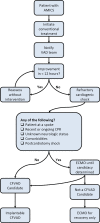Evolving strategies in the treatment of acute myocardial infarction-induced cardiogenic shock
- PMID: 25512903
- PMCID: PMC4250549
- DOI: 10.3978/j.issn.2225-319X.2014.08.03
Evolving strategies in the treatment of acute myocardial infarction-induced cardiogenic shock
Abstract
Despite advances in medical technology and re-vascularization interventions, the mortality rate for cardiogenic shock (CS) following acute myocardial infarction has remained at 50%. The majority of these mortalities are from left ventricular failure resulting in multi-system organ dysfunction. The field of mechanical circulatory support (MCS) has evolved within the past decade, with improved outcomes from extracorporeal membrane oxygenation as well as continuous-flow left ventricular assist devices (CF LVADs). In this paper, we discuss our institutional treatment strategies, the rationale for the protocol development, and our improved outcomes when using MCS in patients with refractory CS following acute myocardial infarction.
Keywords: Cardiogenic shock (CS); acute myocardial infarction; mechanical circulatory support (MCS); ventricular assist device (VAD).
Figures
Similar articles
-
Temporary support strategies for cardiogenic shock: extracorporeal membrane oxygenation, percutaneous ventricular assist devices and surgically placed extracorporeal ventricular assist devices.Ann Cardiothorac Surg. 2019 Jan;8(1):32-43. doi: 10.21037/acs.2018.11.05. Ann Cardiothorac Surg. 2019. PMID: 30854310 Free PMC article. Review.
-
Novel minimally invasive surgical approach using an external ventricular assist device and extracorporeal membrane oxygenation in refractory cardiogenic shock.Eur J Cardiothorac Surg. 2017 Mar 1;51(3):591-596. doi: 10.1093/ejcts/ezw349. Eur J Cardiothorac Surg. 2017. PMID: 27818380
-
Advancements in mechanical circulatory support for patients in acute and chronic heart failure.J Thorac Dis. 2017 Oct;9(10):4070-4083. doi: 10.21037/jtd.2017.09.89. J Thorac Dis. 2017. PMID: 29268418 Free PMC article. Review.
-
Predictors of survival and ability to wean from short-term mechanical circulatory support device following acute myocardial infarction complicated by cardiogenic shock.Eur Heart J Acute Cardiovasc Care. 2018 Dec;7(8):755-765. doi: 10.1177/2048872617740834. Epub 2017 Nov 2. Eur Heart J Acute Cardiovasc Care. 2018. PMID: 29094607 Free PMC article.
-
Mechanical circulatory support for refractory cardiogenic shock post-acute myocardial infarction-a decade of lessons.J Thorac Dis. 2019 Feb;11(2):542-548. doi: 10.21037/jtd.2019.01.21. J Thorac Dis. 2019. PMID: 30962998 Free PMC article.
Cited by
-
Recent Advancements in 3D Printing and Bioprinting Methods for Cardiovascular Tissue Engineering.Bioengineering (Basel). 2021 Sep 27;8(10):133. doi: 10.3390/bioengineering8100133. Bioengineering (Basel). 2021. PMID: 34677206 Free PMC article. Review.
-
Papillary muscle rupture after myocardial infarction during left ventricular assist device support.J Artif Organs. 2017 Sep;20(3):263-265. doi: 10.1007/s10047-017-0951-z. Epub 2017 Feb 26. J Artif Organs. 2017. PMID: 28239740
-
Current Concepts and New Trends in the Treatment of Cardiogenic Shock Complicating Acute Myocardial Infarction.J Crit Care Med (Targu Mures). 2015 Mar 1;1(1):5-10. doi: 10.1515/jccm-2015-0002. eCollection 2015 Jan. J Crit Care Med (Targu Mures). 2015. PMID: 29967809 Free PMC article. Review.
-
3D printing approaches for cardiac tissue engineering and role of immune modulation in tissue regeneration.Int J Nanomedicine. 2019 Feb 20;14:1311-1333. doi: 10.2147/IJN.S189587. eCollection 2019. Int J Nanomedicine. 2019. PMID: 30863063 Free PMC article. Review.
-
Temporary support strategies for cardiogenic shock: extracorporeal membrane oxygenation, percutaneous ventricular assist devices and surgically placed extracorporeal ventricular assist devices.Ann Cardiothorac Surg. 2019 Jan;8(1):32-43. doi: 10.21037/acs.2018.11.05. Ann Cardiothorac Surg. 2019. PMID: 30854310 Free PMC article. Review.
References
-
- Reynolds HR, Hochman JS. Cardiogenic shock: current concepts and improving outcomes. Circulation 2008;117:686-97. - PubMed
-
- Hochman JS, Buller CE, Sleeper LA, et al. Cardiogenic shock complicating acute myocardial infarction--etiologies, management and outcome: a report from the SHOCK Trial Registry. SHould we emergently revascularize Occluded Coronaries for cardiogenic shocK? J Am Coll Cardiol 2000;36:1063-70. - PubMed
-
- Hochman JS, Sleeper LA, Webb JG, et al. Early revascularization in acute myocardial infarction complicated by cardiogenic shock. SHOCK Investigators. Should We Emergently Revascularize Occluded Coronaries for Cardiogenic Shock. N Engl J Med 1999;341:625-34. - PubMed
-
- Hochman JS, Sleeper LA, White HD, et al. One-year survival following early revascularization for cardiogenic shock. JAMA 2001;285:190-2. - PubMed
-
- Brodie BR, Stuckey TD, Muncy DB, et al. Importance of time-to-reperfusion in patients with acute myocardial infarction with and without cardiogenic shock treated with primary percutaneous coronary intervention. Am Heart J 2003;145:708-15. - PubMed
LinkOut - more resources
Full Text Sources
Miscellaneous

